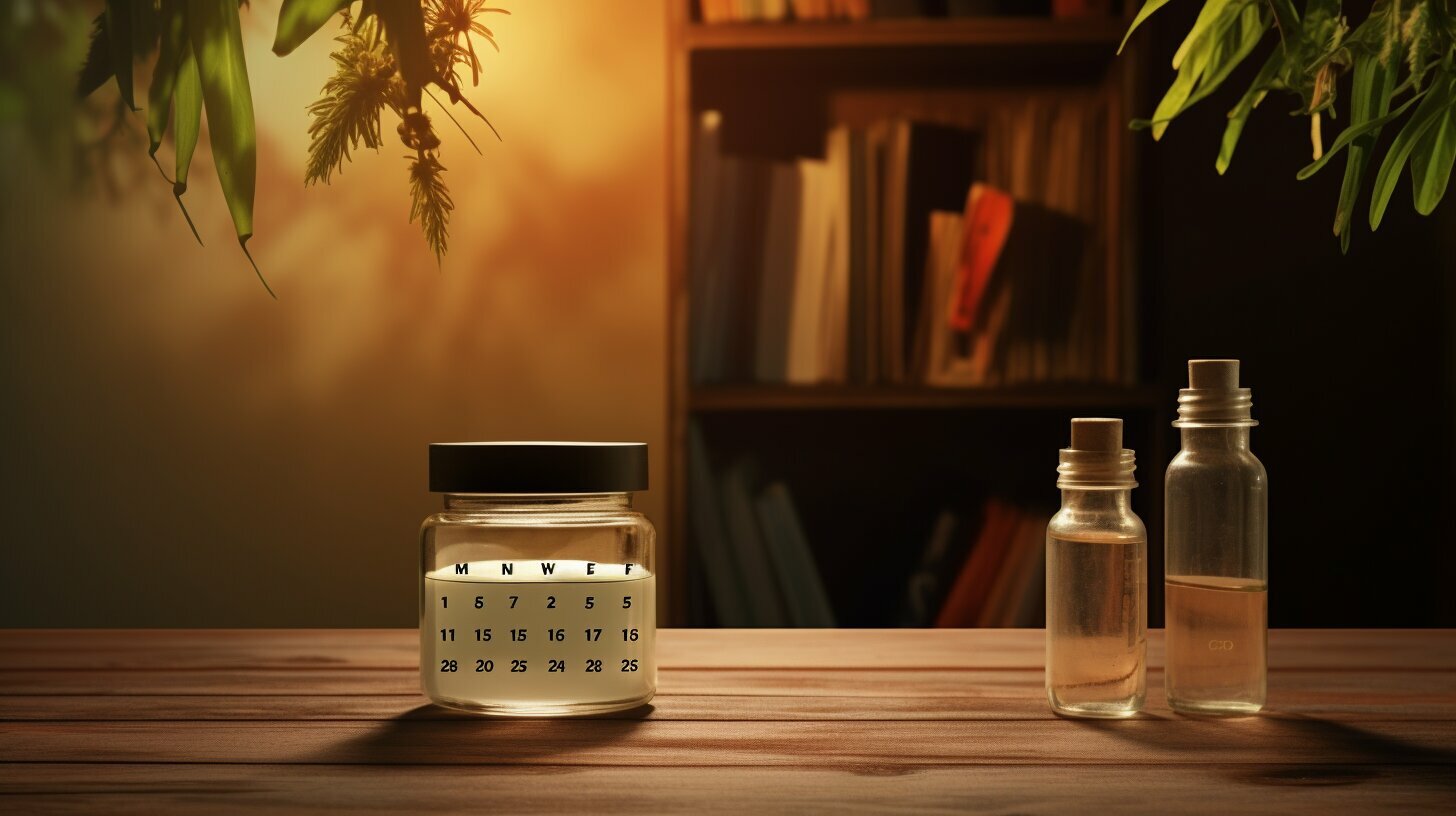
Tea tree oil is a popular essential oil known for its various benefits, but have you ever wondered how long it actually lasts? Understanding the shelf life of tea tree oil is essential for maximizing its longevity and ensuring its effectiveness. In this article, we will delve into the factors that impact the freshness of tea tree oil and provide useful tips for proper storage.
Key Takeaways:
- Tea tree oil can last up to 1 to 2 years if stored properly in a cool, dark place.
- Exposure to heat, air, and light can negatively impact the oil and cause it to lose its freshness and healing properties over time.
- Signs of expired tea tree oil include changes in color, cloudiness, changes in consistency, and a different or unpleasant odor.
- It is important to store tea tree oil in airtight, dark-colored glass bottles and avoid storing it in places with heat or light exposure.
- Expired tea tree oil may not be as effective and could potentially cause skin irritations, so it is recommended to check the expiration date before using it.
Understanding Tea Tree Oil Shelf Life
The shelf life of tea tree oil greatly depends on how it is stored and handled. When stored properly, tea tree oil can last up to 1 to 2 years, maintaining its freshness and healing properties. However, exposure to heat, air, and light can negatively impact the oil and cause it to deteriorate over time.
Signs of expired tea tree oil include changes in color, cloudiness, changes in consistency, and a different or unpleasant odor. These changes indicate that the oil has oxidized and may no longer be as effective.
To maximize the longevity of tea tree oil, it is important to store it in airtight, dark-colored glass bottles. This helps to protect the oil from light and oxygen, which can accelerate its degradation. Additionally, it is crucial to avoid storing it in places with heat or light exposure, such as near windows or in the bathroom.
| Storage Tips for Tea Tree Oil |
|---|
| Store in a cool, dark place away from heat and sunlight. |
| Use airtight, dark-colored glass bottles to protect it from light and oxygen. |
| Avoid storing in areas with temperature fluctuations, such as the bathroom. |
| Check the expiration date before use. |
Expired tea tree oil may not only lose its effectiveness but can also potentially cause skin irritations. It is essential to check the expiration date before using the oil and discard it if it has expired. Purchasing tea tree oil from reputable suppliers ensures that you are getting a fresh product with a longer shelf life.
Factors That Impact Tea Tree Oil Freshness
Heat, air exposure, and light can all contribute to the degradation of tea tree oil and shorten its lifespan. To ensure the longevity of this natural oil, it is crucial to store it properly and protect it from these damaging factors.
When tea tree oil is exposed to heat, it can lead to a decrease in its potency and effectiveness. The heat causes the oil to oxidize, resulting in a loss of its therapeutic properties. It is advisable to store tea tree oil in a cool, dark place, away from direct sunlight or heat sources like stoves or radiators.
Air exposure is another factor that can affect the freshness of tea tree oil. When the oil is exposed to air, it is more susceptible to oxidation, which can lead to a change in color, cloudiness, and even an unpleasant smell. To prevent air exposure, it is recommended to use airtight, dark-colored glass bottles for storing tea tree oil.
Light exposure can also have a detrimental effect on the freshness of tea tree oil. Ultraviolet (UV) light can break down the compounds in the oil, causing it to lose its healing properties. It is best to store tea tree oil in a dark place, such as a cabinet or drawer, to protect it from light exposure.
By taking these precautions and ensuring proper storage, tea tree oil can maintain its freshness and efficacy for an extended period. Remember to check the expiration date before use and purchase tea tree oil from reputable suppliers to guarantee its quality and longevity.
Recognizing Expired Tea Tree Oil
Over time, tea tree oil can undergo changes that signal it is no longer fresh and effective. It is important to recognize these signs to ensure you are using a high-quality product that will deliver the desired results. One of the first indicators of expired tea tree oil is a change in color. The oil may become darker, cloudy, or develop a yellow or brown tint. Additionally, the consistency of the oil may change, becoming thicker or thinner than normal.
Another telltale sign of expired tea tree oil is a different or unpleasant odor. The oil may develop a rancid smell or lose its characteristic medicinal fragrance. These changes are an indication that the oil has oxidized and may no longer possess its full healing properties. It is important to note that expired tea tree oil may not be as effective in treating various skin conditions.
To preserve the freshness and potency of tea tree oil, proper storage is essential. It is recommended to store the oil in airtight, dark-colored glass bottles. This helps protect it from exposure to air, heat, and light, which can accelerate the oil’s degradation. Avoid storing tea tree oil in locations where it may be exposed to direct sunlight or high temperatures, such as near windows or in the bathroom.
When purchasing tea tree oil, always check the expiration date to ensure you are getting a fresh product. Reputable suppliers will provide oils with longer shelf life, allowing you to enjoy the benefits of tea tree oil for an extended period. By following these tips and recognizing the signs of expired tea tree oil, you can maximize the lifespan of your oil and ensure its effectiveness when used.
Storing Tea Tree Oil for Longevity
Proper storage is key to ensuring the longevity of tea tree oil and maintaining its potency. Tea tree oil can last up to 1 to 2 years if stored properly in a cool, dark place. Exposure to heat, air, and light can negatively impact the oil and cause it to lose its freshness and healing properties over time.
When storing tea tree oil, it is important to use airtight, dark-colored glass bottles that can protect the oil from light and air exposure. The dark-colored glass helps to prevent UV rays from degrading the oil, preserving its quality for longer periods. Additionally, storing the oil in a cool place, away from direct sunlight or sources of heat, will prevent it from deteriorating.
Tea Tree Oil Storage Tips:
- Keep the oil in its original packaging or transfer it to a dark glass bottle.
- Store the bottle in a cool, dark place, such as a cupboard or drawer.
- Avoid storing the oil in areas with heat or light exposure, like windowsills or countertops.
- Always ensure the bottle is tightly sealed to prevent air from entering.
By following these storage tips, you can maximize the shelf life of tea tree oil and continue to enjoy its numerous benefits for an extended period.
| Signs of Expired Tea Tree Oil: |
|---|
| Changes in color |
| Cloudiness |
| Changes in consistency |
| Different or unpleasant odor |
It’s important to note that expired tea tree oil may not be as effective and could potentially cause skin irritations. To ensure the oil’s freshness and quality, always check the expiration date before using and purchase from reputable suppliers. By properly storing your tea tree oil and being mindful of its lifespan, you can continue to benefit from its natural healing properties.
Importance of Checking Expiration Dates
Before incorporating tea tree oil into your routine, it is crucial to check its expiration date to ensure its effectiveness. Tea tree oil can last up to 1 to 2 years if stored properly, but exposure to heat, air, and light can degrade its quality over time. By checking the expiration date, you can determine if the oil is still suitable for use.
Expired tea tree oil may not provide the same healing properties and could potentially cause skin irritations. To prevent this, it is important to store tea tree oil in airtight, dark-colored glass bottles to protect it from air and light exposure. Storing it in a cool, dark place away from heat sources is also essential.
To visually identify expired tea tree oil, look for changes in color, cloudiness, changes in consistency, or an unpleasant odor. These are signs that the oil has degraded and is no longer effective. To ensure you are using high-quality tea tree oil, always check the expiration date and purchase from reputable suppliers.
Expert Tip for Longevity: Store in a Cool, Dark Place
If you want to extend the shelf life of your tea tree oil, here’s a helpful tip: store it in a cool, dark place. Heat and light can degrade the oil’s potency, so finding a suitable storage spot is crucial. Keep it away from direct sunlight and avoid storing it near warm appliances or in areas with fluctuating temperatures. By following this simple tip, you can ensure that your tea tree oil remains fresh and effective for a longer period.
| Signs of Expired Tea Tree Oil | Storage Tips for Tea Tree Oil |
|---|---|
|
|
Remember, tea tree oil is a valuable natural remedy with numerous benefits. By checking the expiration date and storing it properly, you can ensure that you are getting the most out of this powerful essential oil.
Purchasing Tea Tree Oil from Reputable Suppliers
To ensure the longest possible shelf life for your tea tree oil, it’s wise to source it from reputable suppliers. By doing so, you can have confidence in the quality and freshness of the oil, knowing that it has been handled and stored properly throughout the production process.
Reputable suppliers understand the importance of storing tea tree oil in optimal conditions to preserve its potency and effectiveness. They use airtight, dark-colored glass bottles that protect the oil from exposure to light and air, which can cause it to deteriorate more quickly. These bottles also help maintain a consistent temperature, reducing the risk of heat damage.
When purchasing tea tree oil, be sure to check the expiration date on the packaging. Reputable suppliers provide oils with longer shelf life, allowing you to confidently use the oil for an extended period. This can save you both time and money, as you won’t need to replace expired oil as frequently.
Expert Tip: Proper Storage for Longevity
To further extend the life of your tea tree oil, consider implementing these storage tips:
- Keep the oil in a cool, dark place away from direct sunlight and heat sources.
- Avoid storing the oil in places like the bathroom or near the stove, where temperature fluctuations are common.
- Ensure the bottle is tightly sealed after each use to prevent air exposure.
- If you purchase oil in bulk, transfer smaller amounts to a smaller, airtight container to minimize air contact.
By practicing proper storage techniques and purchasing tea tree oil from reputable suppliers, you can maximize its longevity and continue to enjoy its numerous benefits for an extended period.
| Tip | Effectiveness |
|---|---|
| Store in a cool, dark place | Preserves freshness |
| Avoid exposure to heat and light | Prevents deterioration |
| Check expiration date | Ensures quality |
| Purchase from reputable suppliers | Extended shelf life |
Potential Risks of Expired Tea Tree Oil
Using expired tea tree oil may pose risks to your skin and potentially diminish its benefits. Tea tree oil, known for its powerful antimicrobial and antiseptic properties, can provide numerous health benefits when used properly. However, when the oil is past its expiration date or improperly stored, it may not only lose its effectiveness but also become harmful to the skin.
“Expired tea tree oil may not only lose its potency but also harbor bacteria and other microorganisms that can cause skin irritations and infections.”
One of the most common risks of using expired tea tree oil is skin irritation. As the oil breaks down, it can become more acidic, leading to redness, itching, and even chemical burns on the skin. Additionally, expired tea tree oil may lose its ability to fight against bacteria, fungi, and viruses, making it less effective in treating skin issues such as acne, dandruff, or nail infections.
To ensure the safety and effectiveness of tea tree oil, it is crucial to check the expiration date before use. Expired tea tree oil should be discarded and replaced with a fresh supply to avoid the potential risks and ensure optimal results. Additionally, it is important to purchase tea tree oil from reputable suppliers who provide oils with longer shelf life and follow proper storage guidelines.
Expert Tip: Proper Storage for Tea Tree Oil
Preserving the freshness and potency of tea tree oil requires proper storage. Here are a few tips to extend the shelf life of your tea tree oil:
- Store tea tree oil in airtight, dark-colored glass bottles to protect it from air and light exposure.
- Avoid storing tea tree oil in areas with heat, as high temperatures can accelerate the breakdown of the oil.
- Keep tea tree oil away from direct sunlight and store it in a cool, dark place such as a cabinet or drawer.
- Ensure the bottle is tightly sealed after each use to prevent air from getting inside.
By following these storage tips and being mindful of the expiration date, you can maximize the longevity and effectiveness of your tea tree oil, ensuring it remains a valuable addition to your skincare or medicinal routine.
Conclusion
Proper storage and regular checks of the expiration date are key factors in prolonging the lifespan and effectiveness of tea tree oil. When stored correctly, tea tree oil can last up to 1 to 2 years, allowing you to enjoy its numerous benefits for an extended period. To ensure its longevity, it is crucial to protect the oil from heat, air, and light, as these factors can degrade its quality over time.
When tea tree oil expires, its color may change, it may become cloudy or develop an unpleasant odor. These are clear indications that the oil is no longer suitable for use. Expired tea tree oil may not provide the desired therapeutic effects and could potentially cause skin irritations.
To maximize the lifespan of your tea tree oil, store it in airtight, dark-colored glass bottles. This will shield it from light exposure, which can accelerate deterioration. Additionally, avoid storing the oil in places with high temperatures or fluctuations in temperature, as heat can compromise its freshness and healing properties.
Always check the expiration date before using tea tree oil. Reliable suppliers will provide oils with longer shelf life, ensuring you are getting a product that is both effective and safe. By following these storage tips and being mindful of expiration dates, you can fully enjoy the benefits of tea tree oil while maintaining its optimal quality.
Expert Tip: Keep Your Tea Tree Oil Fresh for Longer
To ensure your tea tree oil lasts as long as possible, consider storing it in a cool, dark place away from heat and light sources. Heat and light exposure can cause the oil to deteriorate faster, diminishing its freshness and medicinal properties.
Airtight, dark-colored glass bottles provide optimal storage conditions for tea tree oil. The dark glass helps protect the oil from light exposure, while the airtight seal prevents air from entering and causing oxidation.
Avoid storing your tea tree oil in areas where it may be exposed to heat or sunlight, such as near windows or heaters. Instead, choose a suitable location, such as a cabinet or drawer, that remains relatively cool and dark throughout the day.
It’s also important to check the expiration date before using tea tree oil. Expired oil may not be as effective and could potentially cause skin irritations. To ensure you’re using high-quality tea tree oil, always purchase from reputable suppliers who offer oils with longer shelf life.
FAQ
Q: How long does tea tree oil last?
A: Tea tree oil can last up to 1 to 2 years if stored properly in a cool, dark place.
Q: What factors can impact the freshness of tea tree oil?
A: Exposure to heat, air, and light can negatively impact tea tree oil and cause it to lose its freshness over time.
Q: How can I recognize if tea tree oil has expired?
A: Signs of expired tea tree oil include changes in color, cloudiness, changes in consistency, and a different or unpleasant odor.
Q: How should I store tea tree oil for longevity?
A: It is important to store tea tree oil in airtight, dark-colored glass bottles and avoid places with heat or light exposure.
Q: Why is it important to check the expiration date before using tea tree oil?
A: Checking the expiration date ensures that the tea tree oil is still fresh and effective for use.
Q: Where should I purchase tea tree oil from?
A: It is recommended to purchase tea tree oil from reputable suppliers to ensure quality and longer shelf life.
Q: Are there any potential risks associated with using expired tea tree oil?
A: Expired tea tree oil may not be as effective and could potentially cause skin irritations.
Q: What is an expert tip for keeping tea tree oil fresh for longer?
A: Keep tea tree oil in a cool, dark place and avoid exposing it to heat, air, and light to maximize its shelf life.













